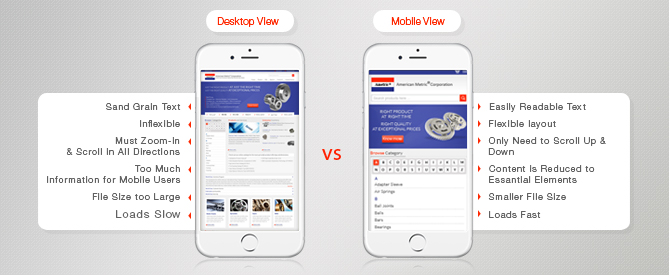More than 1.5 billion smartphones have been sold till date across the world and their usage continues to grow remarkably. The increased use of smartphones has also changed things for businesses, as most of their customers now use mobile devices to reach them online. This makes it important for businesses to improve their online presence and make it more suitable for mobile devices. Having a mobile website for a business has become the norm nowadays especially if a business wants to stay successful.
What’s wrong with your existing website? Most of the time when customers access your site from a
mobile device, your site’s functionality is affected due to the shift in screen size and resolution. Moreover, the site is downloaded at an extremely slow speed on mobile and it might not open at all if it has too much content. This also makes it difficult, sometimes impossible, for the customers to shop online if they are using a mobile device.
Overall, it just ends up giving a bad customer experience, which might drive your customers to the competitors. Obviously, that is not what you want for your business, which is why having a separate mobile site for your business makes sense. It just makes the customers’ experience of shopping online at your site all the more incredible. However, there are several other benefits of having a mobile website as well, some of which are mentioned here:
It Increases Customer Engagement Time
On a mobile-specific website, the customers immediately get access to the most relevant data and features they would require. Also, location-aware technology in phones today makes it easier for customers to locate your business when they are nearby. This doesn’t only increase customer engagement with your site but also increases the time they spend browsing on your site.
It Boosts Sales
According to a Nielson survey, 20% adult smartphone owners have admitted they have made an online purchase using their phone at least once. This number is increasing fast and more customers are expected to shop online from mobile devices in the future. By having a website, you make it easier for them to make this purchase from your site, increasing your sales significantly.
It Improves Your SEO Performance
When searched on mobile-friendly search engines, your website will be ranked higher if you have a separate mobile website. This includes major search engines, like Google and Yahoo. Also, having a separate mobile website for your business will get you a place in different local and mobile site directories.
It Integrates Well with Offline Media
Quick Response Codes (QR) are used quite commonly today by businesses to close the gap between their online and offline media and these codes work through mobile devices. Quick Response Codes (QR) codes appear on the print material of a website and when scanned from a phone’s camera, lead to a webpage of that business using the phone’s browser. This integration brings an altogether different dimension to your communication with your audience, increasing the effectiveness of your marketing efforts significantly.
It Gives Advantage over Competitors
If your competitors don’t have a mobile website yet, you can gain a definite competitive edge over them by getting one. Since mobile sites improve the user experience to a significant extent, customers prefer them over traditional sites when they are browsing on mobile devices. If companies don’t offer easy access to customers, they are more likely to switch to other companies, which can be you if you have a mobile website.
Mobile Website vs. Mobile Apps
People normally confuse that they also have the option of getting a native app developed for smartphones instead of a website. A Mobile App is in fact not comparable with a Mobile website, both have their distinct set of advantages.
A mobile website, is accessible all the time without any restrictions and more cost-effective for you to manage whereas an App is of no use until the customers choose to download your app on their device. Apps have their own audience and serve as an additional measure of reaching out to your customers whereas a mobile website is no more an add-on. The touch and feel of App is no doubt superior than a mobile website. You can say that an App is luxury while a Mobile website is necessity.
Creates New Advertising Opportunities
There are ample mobile advertising opportunities available online, such as Google AdWords and PPC networks, which allow your ads to show up in mobile search results. However, these ads can only be effective when they lead the audience to mobile-optimized web pages. These landing pages should be fully functional on mobile devices and offer precise and relevant information.
Portability and Connectivity
A mobile website allows your customers to access you anytime, from anywhere with their phone. Having a constant connection with your target audience allows you to get in touch with them in innovative ways with the latest news and promotions, no matter where they are.
Content Prioritization
Having a mobile site allows you to display only the portion of your content that is most relevant and important to increase sales. You can choose to display current promotions and deals on your mobile website homepage to get the customers convinced to make a purchase. If you don’t want to come out as too aggressive with deals and promotions, you can select the most compelling content portions from your original site to be displayed on your mobile website. You can skip the content which is heavy in size and would load slow on mobiles.
It’s also a fact that having a separate mobile site or application is not just a concept to consider anymore. Rather, it’s an inevitable tool companies need to have in order to communicate effectively and efficiently with their customers.







Leave A Comment